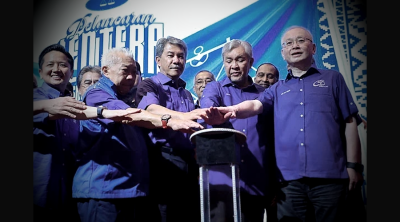
In 1993, the United States forced a Chinese vessel, the Yinhe, to be stranded in the Indian Ocean for four weeks by jamming its GPS equipment.
This left the ship and its crew in dire straits, highlighting the vulnerability of relying on foreign navigation systems.
Fast-forward three decades, China’s BeiDou satellite navigation system has emerged as a superior, more accurate, and reliable alternative to its US counterpart.
Today, no Chinese ship has to depend on American GPS signals anymore.
Despite stringent export controls and sanctions imposed by the US and its allies, China continues its technological advancements.
Sanctions failed to stop its missions as the country relentlessly launched satellites and conducted space exploration activities, particularly in lunar exploration.
In 2019, China’s Chang’e-4 mission made history by landing on the far side of the Moon, exploring the Moon’s South Pole-Aitken basin. In 2020, the Chang’e-5 mission returned lunar samples to Earth for the first time in over 40 years and detected water in its soil.
These discoveries are crucial for future lunar missions and potential moon mining projects.
China plans to build an International Lunar Research Station (ILRS) and explore Mars, Venus, and Jupiter from there.
Segue to the current nail-biting US presidential race where Kamala Harris and Donald Trump are locked in a fierce battle for the White House, the outcome of which will determine not only the direction of US domestic policy but also influence the country’s approach to its strategic rivalry with China, especially the tech war.
The on-going technology war is a high-stakes contest for global dominance in critical areas such as semiconductors, artificial intelligence (AI), space missions, and 5G technology.
Both nations are vying for leadership in these fields, recognising that technological superiority is key to economic and military dominance in the 21st century.
Regardless of who wins the presidential race, the tech dual is expected to intensify.
However, Harris and Trump have different approaches to this high-stakes rivalry.
Harris will likely continue the Biden administration’s strategy of working with allies to impose targeted export controls and restrictions on Chinese technology companies.
This approach aims to curb Beijing’s technological advancements while maintaining strong international alliances.
Harris has emphasised the importance of multilateral cooperation and has called for increased investment in American innovation and research to stay ahead of China.
Trump, on the other hand, may adopt a more aggressive stance.
During his previous term, he imposed broad tariffs on Chinese goods and implemented sweeping penalties on its tech companies.
He criticised Beijing for unfair trade practices and intellectual property theft, taking a hardline approach to counter its rise.
If re-elected, Trump will likely continue this aggressive strategy, potentially escalating tensions further.
The outcome of the US presidential election will have significant implications for global innovation and economic stability.
The Washington-Beijing tech war is not just a bilateral issue; it affects the entire world. It has spurred innovation in both countries. However, it also poses risks to global innovation.
Technology transfer and collaboration restrictions can hinder knowledge flow and slow technological progress.
A more cooperative approach could foster greater innovation and benefit the global tech ecosystem.
The tech rivalry is reshaping geopolitical dynamics, with countries worldwide drawn into the vortex.
US allies are pressured to take sides, while China seeks to expand its influence through initiatives like BeiDou’s low-cost satellite navigation offers.
The outcome of the US presidential election will influence how these geopolitical dynamics play out.
In the movie Gravity (2013), an American astronaut Dr Ryan Stone, played by Sandra Bullock, is forced to navigate to a Chinese space station, the Tiangong, to ultimately return to Earth after a catastrophic debris collision in space, effectively being “saved” by the Chinese mission.
This cinematic portrayal of international cooperation is a powerful reminder that collaboration can achieve remarkable outcomes.
Regardless of who wins the ticket to the White House, cooperation helps everyone everywhere. Trying to defeat an enemy is a short-sighted goal; winning them over is a more sustainable and beneficial vision.
The US presidential race and the technology war with China are intertwined in a high-stakes battle for global dominance.
The election’s outcome will shape this rivalry’s future and impact worldwide innovation and economic stability.
As we navigate this complex landscape, pursuing strategies that foster international cooperation, protect national interests, and promote a prosperous and secure future for all is essential.
(Dr Sayeed Ahmed is a consulting engineer and the CEO of Bayside Analytix, a technology-focused strategy and management consulting organisation.)
ADVERTISEMENT
ADVERTISEMENT








































